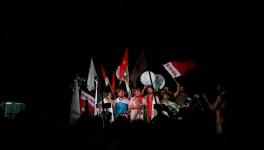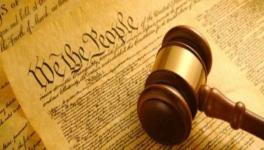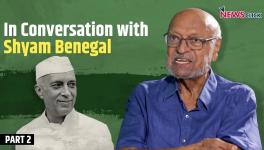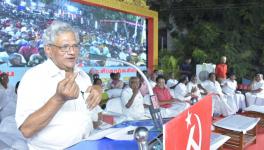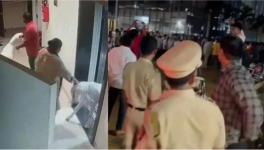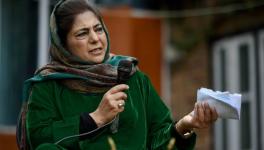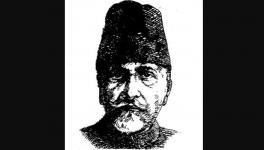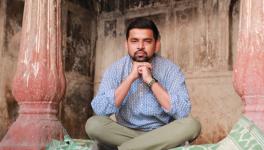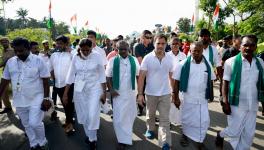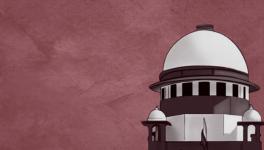‘I See My Father’s Nation Fading Away’
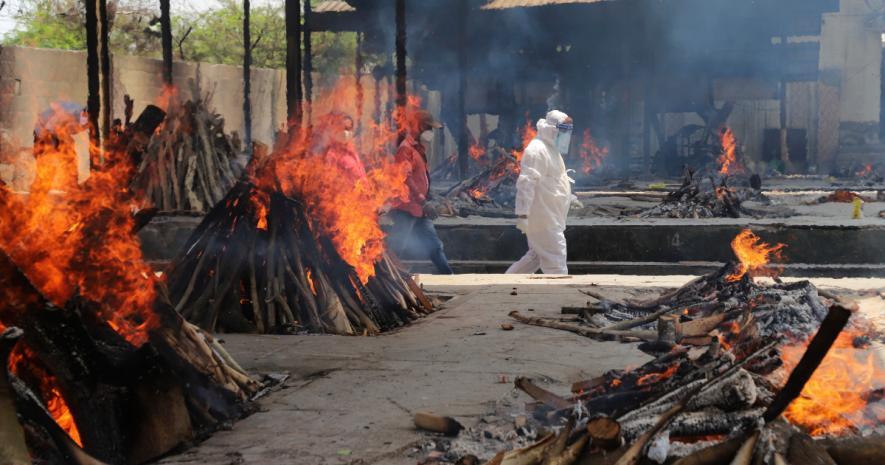
Representational Image. Credit: Al Jazeera
Ashok Ranjan Datta, my father, died an untimely, avoidable and horrific death three years ago in the second wave of Covid-19 in Delhi. He died on April 27, 2021 when Delhi’s hospitals were overwhelmed and out of oxygen. We dashed from hospital to hospital begging for help -- any help -- as he struggled to breathe. His head was on my lap, as we drove around, only to be turned away from every hospital without the medical staff even glancing at my father.
It was finally the government hospital in Malviya Nagar that agreed to at least take a look at him, but it was already too late: they pronounced him brought dead. This was a 68-year-old man who was healthier and more fit than me at less than half his age. He died because India’s healthcare system was unprepared, even after a whole year of knowing the threat posed by Covid-19.
But what was immensely tragic was that this man, who had come to India as a boy fleeing persecution in East Pakistan, who had devoted his life to the country as an upright public servant, and who was the greatest patriot I have ever known, died because his country failed him.
I have not had the words, or the courage, to write this for three long years. But today, I feel that my father’s story - of his life and what he believed in, as much as his death and the failures that killed him -- needs to be recounted and remembered. I am writing this because we seem to have forgotten how the catastrophe that was India’s second Covid-19 wave, was essentially man-made. More importantly, I am writing this because the nation my father loved, and taught me to be proud of, is today gasping for its own breath.
April 27, 2021 is not a date my family and I can ever forget. Later, that same night, after I had put my father’s lifeless body in a morgue where three corpses had to be stacked on top of each other in a space meant for one, we were back on the streets with my grandmother, as her oxygen count dropped critically low. Less than an hour later, my grandmother died in my sister’s arms, as she too was turned away from every hospital.
To be clear, I blame no one more than myself for their deaths and the horror of that night. But the more I thought about those days: about the apathy, the mismanagement, the inaction, the misinformation and the outright lies, the more my grief turned to anger. Three years on, that anger has now turned to dismay, as I realise that we have all simply forgotten what actually happened, how countless lives were lost because of an unacceptable level of mismanagement of the crisis. In the clamour of beating household utensils, we have drowned from our memory and conscience the corpses that were in our sacred rivers.
Countless families watched their loved ones suffer and die, and my family’s ordeal was nowhere near the worst of tragedies that befell this nation. A friend and the young father of a scared 6-year-old boy died because of lack of medicines three days later; both parents of a brother-in-law died a few days after; countless elderly relatives were robbed of many more years of their lives, just as we were robbed of their love, care and guidance. But, none of this was any act of nature or god; this was a catastrophic failure of public policy, planning, management and leadership.
If we let those who failed us get away with it then we give them reason to believe that they can get away with worse in the future. This is not the time to forget the horrors of three years ago, but to revisit those painful memories and ask questions that remain unanswered.
Why did we run out of oxygen a whole year into a pandemic caused by a respiratory infection? Why did state after state, including Delhi, shut down their temporary Covid-19 hospitals and wards in early 2021 even before the full vaccination roll-out? Why was the PM CARES fund not open to public scrutiny? Why was a separate fund needed in the first place? What happened to the vast majority of its thousands of crores that remained unspent? What was the true number of Covid-19 fatalities in India given that most subsequent studies have shown that the actual numbers could be 5 to 8 times higher? Why was the Kumbh Mela in Haridwar allowed given the disproportionate risk, which turned out to be true, of being a super spreader? Why was the Kumbh Mela not criticised for the death and devastation it wrecked while the Tablighi Jamaat meeting in Nizamuddin a year earlier, despite causing a fraction of the cases and fatalities, was criminalised and made the subject of unabashedly Islamophobic media outrage? Why has no elected leader, be it Chief Ministers or the Prime Minister of the country, apologised, let alone resigned in shame, for abetting through negligence the greatest loss of life in independent India? How did we forget to ask these questions? When did we decide to let our loved ones’ deaths be for nothing?
These questions, and the accountability they demand, are needed today more than ever as we elect a new government and determine the course of our nation’s future. Our handling of the pandemic is just one of many pressing issues that need to be the focus of our political debates: the unemployment crisis, the agrarian crisis, caste injustice, gender inequality and the climate crisis, to name a few others. Asking tough questions and exposing the incompetence, lies and misinformation spread by our elected representatives is the very oxygen our democracy needs today.
My father had immense faith in the democratic and egalitarian ethos of this nation, and he held on to them even as he saw the values and principles he cherished erode in what were to be his final years. For a young boy who fled sectarian and communal violence, who saw his family become refugees because of hatred, who was bullied in his Calcutta school for his unkept hair and East Bengal accent, he knew all too well the dangers of prejudice and bigotry, and the price we all ultimately pay for them. For him, the very idea of India was its inclusivity- that you did not have to fit into any narrow criteria to call this nation home. His was the India where this refugee misfit of his school could go on to crack the nation’s highest examination and become a proud administrator and serve his country.
My father and I disagreed on many things, and we certainly did not share the same kind of politics, but we could agree to disagree and lose no love over it. He was a god-fearing religious Hindu, while I remained indifferent to all religions. Both my sister and I studied in Christian schools where we were expected to read the Bible, but he never batted an eyelid over it. He was patriotic to the point of exasperation, ensuring his office staff were always in attendance for flag hoisting on January 26 and August 15, when most of his peers would simply ask an office orderly to raise the flag without ceremony. He was, after all, the same person who stood up, even in our living room, every time the little boy in Kabhi Khushi Kabhi Gham sang the national anthem. But, most importantly, he never forced any of us to stand with him. My father’s patriotism embraced difference because that, to him, was the very essence of what made this nation his home. And secularism, inclusivity, kindness and respect for difference were the very foundations of my father’s India.
Unity-in-diversity was a wearying cliche when I was growing up, but seeing where the nation is headed today, I cannot help but feel nostalgic for even those tokenistic ‘national unity’ PSAs (public service announcements) that used to run on Doordarshan in the 1990s. My sister still bows her head in respect whenever she crosses any house of worship, be it a mosque, church or temple--something that our father taught us. He believed in equal respect for all religions and in the impartiality of the law. He would order the demolition of all unauthorised structures in his jurisdiction, be it a mandir or a mazaar that had cropped up overnight.
My father remembered the words of the Pakistani national anthem he used to sing before coming to India, and remarked how Partition was a collective tragedy for all of South Asia. He told us how the oppression and exploitation of Bengali Muslim peasants by upper caste Hindu landowners was an integral part of understanding Bengal’s partition and history. He was a Left-wing radical in his college days but became the greatest critic of India’s Left parties later.
He told us the stories of Ramayana and Mahabharata at night when we were kids, but never once begrudged the irreligiosity of my teenage years. For a man who valued his masculinity despite my disparagement, his wife’s independence and professional success that often eclipsed his own were never anything other than admirable. He visited churches and Sufi shrines with as much faith as he would go to a temple, if not more. He liked talking to people and getting to know them – the more different from him, the better – and he did not have to hate them to disagree with them.
My father’s idea of nation did not find any of this contradictory, and even less so the cause for alarm or fearmongering. Today, when a sitting Prime Minister openly exploits religion for votes and targets India’s Muslims, I see my father’s nation fading away.
It is not that India did not have megalomaniac leaders or challenges of inequality and injustice before this. But earlier, as my father would say, at least we, as a people, aspired and strived toward being better, not worse. While he is not around to see the new lows we have sunk to, there was an unmistakable anguish in his final years as he saw the dark turn the country was taking. Yet, he did not lose hope. He would tell us that one day, the people of this country would see through this divisive agenda and reaffirm the democratic pluralism that has always been India’s greatest strength. “All this will run its course,” he told me during the raucous 2021 West Bengal elections, the results of which he would not live to see, “because these lies and this politics of hatred cannot last.”
My father has already paid the price for the lies of our rulers with his life, so I can only hope against hope that he was right about the wisdom of this nation’s people in ending this politics of hate.
Abhishek Ranjan Datta is a research scholar reading for DPhil in International Development at the University of Oxford. The views are personal.
Get the latest reports & analysis with people's perspective on Protests, movements & deep analytical videos, discussions of the current affairs in your Telegram app. Subscribe to NewsClick's Telegram channel & get Real-Time updates on stories, as they get published on our website.









